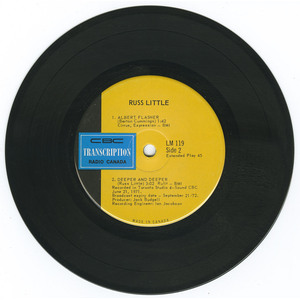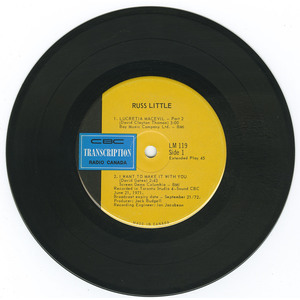Information/Write-up
Russ Little: Canada's First-Call Trombone
By Robert Williston
Russ Little has been a fixture of Canadian music for more than five decades—an in-demand trombonist, arranger, and bandleader whose work spans big band jazz, progressive rock, and television variety. Known for his hard-driving solos and crisp arranging, Little helped define the horn sound of Canadian radio, stage, and screen through the 1970s and beyond.
Born in Toronto in 1941, Little spent part of his early childhood in Jamaica before returning to Canada, where he studied music at the University of Toronto. Under the guidance of Ward Cole and Godfrey Ridout, he trained in conducting and composition while playing R&B and jazz gigs around the city. By the late 1960s, his horn was already in demand internationally—touring with Woody Herman’s orchestra, performing in Belgium with Slide Hampton, and joining the Ted Heath Orchestra in England.
In 1969, Little became an original member of Lighthouse, the groundbreaking Canadian rock-jazz fusion group known for its orchestral lineup and horn-driven sound. His trombone work helped define the band’s early albums and energetic live shows. Around the same time, he also joined Rob McConnell & The Boss Brass, one of the most celebrated big bands in Canadian history. With McConnell, Little served both as a section player and arranger, contributing to the ensemble’s signature sound during its peak years in the early 1970s.
In 1972, Little recorded his only known solo 45 as part of the CBC Radio Canada LM series. Released as CBC LM 119 and recorded at Studio 4-Sound in Toronto on September 21, 1972, the EP features bold, jazz-pop interpretations of David Clayton-Thomas’s “Lucretia MacEvil,” Bread’s “I Want to Make It With You,” and the Guess Who’s “Albert Flasher.” But it's the fourth track—Little’s original composition “Deeper and Deeper”—that truly stands out. A furious, psych-infused blast of swirling guitars, tight horns, and orchestral drama, it delivers a high-octane fusion of jazz and rock that feels like a natural extension of the Lighthouse sound. Remarkably, the session was recorded right between Lighthouse’s breakthrough hit One Fine Morning (1971) and their chart-topping Sunny Days (released just weeks earlier in September 1972), placing Deeper and Deeper squarely within the creative surge of early 1970s Canadian horn-rock. The record remains one of the rarest and most musically adventurous entries in the CBC LM catalog.
Beyond his ensemble work, Russ Little built a parallel career as a composer, arranger, and musical director. He wrote and conducted music for a range of Canadian television programs throughout the 1970s and 1980s, including The Patsy Gallant Show, Shake, Rock and Roll, and Circus. For over 15 years, he served as musical director for the Miss Canada and Miss Teen Canada pageants. He also composed music for CBC specials, documentaries, and stage works—most notably Black Hallelujah (co-written with Norman Symonds) and Cosmic Orpheus, which was performed by the New York City Ballet in the mid-1970s.
Little’s compositions have been recorded by vocalists such as Salome Bey, Dusty Springfield, and Shirley Eikhard, while his session work spans appearances on albums and soundtracks ranging from jazz to R&B. In 1990, he formed the Russ Little Big Band, leading performances in Toronto venues like Rockit with a focus on modern jazz arrangements and standards.
In 2007, Little was named Trombonist of the Year at the National Jazz Awards. His playing, described by critic Peter Goddard as “rooted in bop via R&B, with a funky, edgy tone,” has remained instantly recognizable—bold, melodic, and full of character.
Today, Russ Little continues to perform, record, and mentor. His career, crossing borders and genres, reflects the full arc of Canadian jazz and studio music history. Whether powering the horn section of a rock orchestra or leading a tight big band arrangement on national television, his contributions are a lasting part of the country’s musical fabric.
-Robert Williston
Produced by Jack Budgell
Engineered by Ian Jacobson
Recorded at Studio 4-Sound CBC, Toronto, September 21, 1972



No Comments